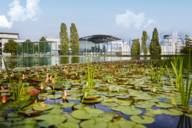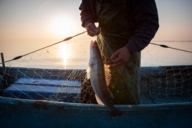
To mark ‘World Environment Day’, we spoke to Doris Wagner from Messe München, Karen Kosuch from Hotel Scandic München Macherei and Constanze Kunz from Platzl Hotel München about sustainable ideas in their organisations.
Sustainability is far more than a passing trend, both in general and in the events industry. It has evolved into an indispensable necessity, deeply rooted in public consciousness. Superficial "greenwashing" and mere image-building are no longer sufficient; instead, we are in the midst of a paradigm shift that is fundamentally reshaping our thinking and actions.
On today's World Environment Day, we took the opportunity to speak with Doris Wagner, Director of Public Policy & ESG at Messe München, Karen Kosuch, Sales Manager at Hotel Scandic München Macherei , and Constanze Kunz, Executive Assistant at Platzl Hotel München, about the proactive implementation of sustainable practices in their organizations
Let's start with a basic question:
1. How do you actively work to reduce the environmental footprint of your events?
Doris Wagner, Messe München:
At Messe München, we consistently strive to reduce our CO₂ footprint and place a strong emphasis on sustainable event management. We implement a variety of measures to achieve this. Two concrete examples I would like to highlight: Firstly, we largely eliminate aisle carpets at many of our in-house trade fairs to conserve resources. For instance, at IFAT 2022, this measure saved 484 tons of CO₂, equivalent to about 1,000 flights from Munich to Mallorca.
"At IFAT 2022, this measure enabled us to save 484 tonnes of CO₂, which corresponds to around 1,000 flights from Munich to Mallorca."
Secondly, we primarily use the circular stand construction system Woodi, developed by our subsidiary meplan, for the in-house stand areas at our events. Woodi aims to ensure that all material flows operate in a closed loop by 2028. This circular approach significantly reduces waste at the end of our trade fairs.
Karen Kosuch, Hotel Scandic München Macherei:
For us, it doesn’t matter whether a guest is staying overnight, attending a business lunch, or hosting a small meeting - we provide the same sustainability package to everyone. Sustainability is deeply embedded in Scandic's DNA. We started back in 1993 with the "hang-up-your-towel" policy and have continually introduced new initiatives since then, such as eliminating single-use plastics in 1996, and implementing measures to reduce food waste and CO₂ emissions. Our international corporate goal is to reduce CO₂ emissions per guest/night to zero by 2025.
Constanze Kunz, Platzl Hotel München:
We use 100% green electricity and, instead of energy-consuming air conditioners, our event rooms are cooled by using regional district cooling. Naturally, we avoid single-use packaging, and our kitchen prepares coffee breaks and lunches with mainly regional ingredients. Thanks to our central location, we are easily accessible via public transportation, and we offer nine charging stations for electric cars in our underground parking garage.

2. What measures have been taken to improve energy efficiency and conserve resources? Can you provide some concrete examples?
Karen Kosuch, Hotel Scandic München Macherei:
We can only improve if we understand what we are doing. For instance, we weigh food waste from the breakfast buffet and display the results in the restaurant. As for my role in the sales team, we already operate at a very high standard. Every step counts; therefore, we travel exclusively by train, work paperless, and of course, separate waste in the offices.
Constanze Kunz, Platzl Hotel München:
Besides the district cooling mentioned earlier, the hotel has state-of-the-art heating technology that is automatically regulated by sensors. We are currently replacing windows throughout the property to improve sound insulation and thermal efficiency. Many back-of-house areas are equipped with motion sensor lighting. Additionally, we now offer tap water and have purchased a cardboard compactor to extend the intervals for delivery and pickup trucks.
Doris Wagner, Messe München:
As an exhibition company, we have a high energy demand. Therefore, we focus on the efficient use of energy and CO₂-neutral energy supply. Since the construction of our exhibition grounds over 25 years ago, we have pursued a sustainable concept and continuously optimized it. For example, Messe München has one of the largest and longest-running photovoltaic rooftop systems in the world, along with a district heating connection partially supplied by geothermal energy.
"Messe München has one of the world's largest and longest-operating photovoltaic roof systems as well as a district heating connection that is partly fed by geothermal energy."
Since early 2020, we have been using exclusively renewable electricity, leading to an annual saving of about 6,400 tons of CO₂. Previously, more than half of our electricity needs were covered by renewable sources. Additionally, by the end of 2026, we will replace conventional lights with LED fixtures in our 18 exhibition halls, three main entrances, and the administration building, resulting in an annual saving of 1.5 GWh – cutting the electricity consumption per hall in half.

3. How do you collaborate with local suppliers and service providers to find innovative ways to enhance environmental sustainability?
Constanze Kunz, Platzl Hotel München:
We prioritize working with regional service providers and suppliers to contribute to local value creation and avoid long delivery routes. Another advantage of partnering with local businesses is the ability to visit and personally assess their production processes. For example, our service team enthusiastically recommends fish from the Birnbaum fish farm, and our new collaboration with Dallmayr is perfect for coffee training since their headquarters are just a stone's throw from our hotel.
Karen Kosuch, Hotel Scandic München Macherei:
When choosing between price and sustainability, it's an easy decision for us. Our aim is to serve meat exclusively from Germany; certain fish from abroad are even blacklisted, and eggs at our buffets are strictly ECC-certified.
Doris Wagner, Messe München:
Working with our local suppliers and service providers plays a crucial role in promoting environmental sustainability. We are currently developing a waste prevention guide for exhibitors in close cooperation with external supply partners, customers, and our stand construction subsidiary, meplan. The guide aims to provide exhibitors and their booth builders with specific recommendations on how to avoid waste and save CO₂. We see ourselves as partners to our clients, exhibitors, and booth builders. We can develop and implement sustainable solutions only together.

4. What strategies are employed to reduce waste at events and promote recycling, especially given the high consumption of materials?
Constanze Kunz, Platzl Hotel München:
The goal is to find creative ways to reuse leftover food and prevent it from being wasted. For instance, leftover pretzels from breakfast are turned into our popular pretzel chips, which we serve with drinks at our Josefa Bar. Waste that cannot be avoided must be properly separated and disposed of to enable effective recycling and the creation of new materials.
Doris Wagner, Messe München:
Our strategies for waste reduction and promoting recycling at events are based on comprehensive waste and resource management with significant leverage effects. The primary goal is waste prevention. Therefore, we are developing the previously mentioned exhibitor guide to ensure that waste is minimized from the start.
"Our top priority is to avoid waste. That's why we are currently developing the aforementioned exhibitor guidelines to ensure that waste is avoided in the first place."
However, since waste cannot be completely avoided, we are also revising our disposal strategy to maximize the recycling of valuable materials left behind and ensuring high-grade reuse of other waste. For example, wood waste is reprocessed and either recycled or used in power plants for energy recovery. These measures encourage effective recycling and help reduce material consumption at our events.
Karen Kosuch, Hotel Scandic München Macherei:
Especially with buffets, it is challenging to completely avoid food waste. At Scandic München Macherei, we work with small buffets that are continuously replenished. To stay with this example, we have "No Waste Products" like fruits, hard-boiled eggs, and bacon from leftovers. We try to create new dishes for our guests from these products, such as our "Yesterday's Heroes." Additionally, we collaborate with our partner Too Good To Go, a platform to reduce food waste, and have saved over 50,000 kg of CO₂ since the beginning of our partnership in 2018. For us, reducing food waste is only the beginning; leftover food is collected and converted into biogas, returning it to the ecosystem.

5. What do you see as the biggest challenges in implementing sustainable concepts in the event industry?
Constanze Kunz, Platzl Hotel München:
We always try to find a good balance between maximum flexibility, spontaneity, and comfort for guests, as well as planning certainty for staffing and food.
Doris Wagner, Messe München:
One of the biggest challenges in implementing sustainable concepts in the event industry is the need for a collective mindset shift. Awareness of sustainability and the willingness to implement corresponding measures must be promoted among employees, service partners, exhibitors, and visitors.
‘"One of the biggest challenges in implementing sustainable concepts in the event industry is the need for a collective rethink."
To meet this need for information and ensure transparency, we offer regular ESG (Environmental, Social & Governance) training for our staff to provide them with basic knowledge on sustainability, inform them about current legislation, and keep them updated on our sustainability program. We will intensify these internal communication measures soon.
Karen Kosuch, Hotel Scandic München Macherei:
The balance between high service standards and the willingness to opt for sustainable options. Eco-friendly choices are not always the most cost-effective, and raising awareness of their significance among clients is essential. At Scandic, since 2019, we have introduced the Eco Stay option to save on cleaning materials and water. Here, daily housekeeping is skipped unless requested by the guest, in which case it is, of course, provided for free.

6. Can you share an innovative measure or best practice in the field of sustainability that distinguishes your organization?
Doris Wagner, Messe München:
The newly launched cross-industry network "bgreen leaders," which we are promoting together with CIRCULAZE, is a prime example of innovative measures in sustainability. In light of the challenges of sustainable transformation, we created this network to foster exchange and collaboration across different sectors.
"bgreen leaders" aims to bring together the industries of the future to address today's challenges and jointly develop solutions for a sustainable future. Establishing a cross-industry sustainability network is a logical extension of Messe München's strategy in this relevant area. Thanks to our core business expertise and the specific focuses of our trade shows, Messe München is the ideal platform to contribute effectively to achieving climate goals across sectors.
Constanze Kunz, Platzl Hotel München:
We take responsibility for future professionals in our industry. Since 2019, we have increased our number of trainees and dual students from around 20 to 40 to combat the labor shortage. The ongoing digitalization in our property will continue to automate more work processes. Therefore, high-quality training for our young talent is crucial to meet new demands. Additionally, we have developed a leadership development program, for which we were awarded the HR Hospitality Award. We believe that only sustainable staff development leads to economic success.
Karen Kosuch, Hotel Scandic München Macherei:
Many practices first introduced by Scandic as a hotel chain are now standard in the industry. Examples include the towel policy mentioned earlier, dispensers instead of individually packaged toiletries, and the use of water dispensers and carafes in the restaurant and at events, served in recycled glass. Scandic was one of the first hotel chains to publish sustainability reports to emphasize their importance. Moreover, the commitment of our employees is a decisive factor at Scandic. Every single one stands behind the ideas and values of sustainable thinking, which has been ingrained since the '90s, and implements them in daily operations.

7. How are employees involved in sustainability efforts, and what measures are taken to raise awareness and engagement among teams?
Constanze Kunz, Platzl Hotel München:
It is important to educate about the necessity and reasons for greater sustainability without being preachy. The best way is to lead by example and demonstrate sustainable practices in everyday life. We have already organized a successful workshop with staff to explain the basics of sustainable development and identify small and large levers for change in daily life. This way, everyone has the chance to contribute to greater sustainability both privately and professionally. Further workshops are being planned.
Doris Wagner, Messe München:
To involve our employees in sustainability efforts and promote awareness and engagement, we established the internal sustainability network "ConnectGreen". This network raises awareness and motivates our employees to actively participate in our sustainability initiatives. Newly elected core team members act as sustainability ambassadors, sharing knowledge and updates about Messe München's sustainability commitment within the company. They also gather feedback, suggestions, requests, and ideas from employees, contributing to a sustainable corporate culture.
Karen Kosuch, Hotel Scandic München Macherei:
Every step counts. Each employee receives a specially designed Scandic bottle upon joining to fill with filtered local tap water. We offer training sessions on sustainability and the opportunity to actively participate in our Green Committees. The Green Committee implements ideas for greater sustainability in practice.
Our MICE partners - Messe München, Hotel Scandic München Macherei, and Platzl Hotel München- vividly demonstrate how deeply embedded and essential sustainability already is in the events industry. Their commitment and the measures they have implemented underscore that going green is not a trend but an imperative. We sincerely thank them for their insights and for showcasing how sustainability is integrated into every aspect of their operations.
Ready to elevate your next event to a new, sustainable level? The Munich Convention Bureau is here to support you every step of the way. Together, let's develop customized, sustainable concepts and make your event an eco-friendly success! Contact us today and take a stand for the future.